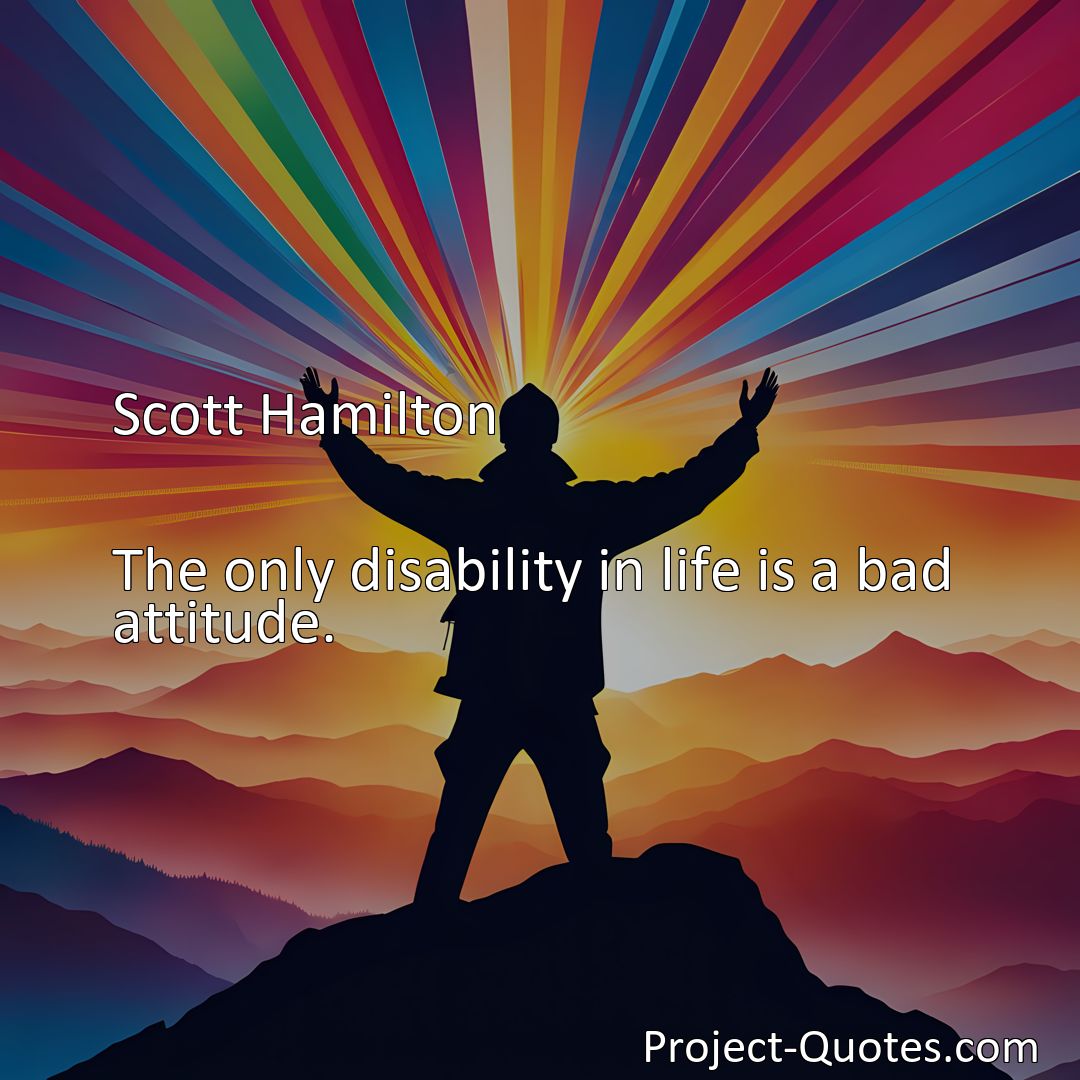The only disability in life is a bad attitude.
Scott Hamilton
In the article titled “The Power of Attitude: Embracing Possibilities,” the importance of maintaining a positive attitude is explored. Attitude, defined as a person’s outlook on a situation, plays a vital role in shaping our lives, influencing our actions and interactions with others. A positive attitude empowers individuals to overcome obstacles, attracts positive people and situations into their lives, and inspires personal growth and success. In the face of disabilities, a positive attitude becomes even more crucial, as it determines whether one is limited by their circumstances or empowered to achieve their goals.
Table of Contents
Meaning of Quote – The only disability in life is a bad attitude.
It is often said that the only disability in life is a bad attitude. But what does that mean exactly? How can an attitude be considered a disability? In order to understand this quote, we must dig deeper into the power of attitude and how it can both hinder and empower individuals.
Attitude, defined as a person’s outlook or perspective on a situation, plays a crucial role in shaping our lives. Our attitude influences our actions, decisions, and interactions with others. It reflects our mindset, beliefs, and values. When we approach life with a positive attitude, we are more likely to navigate through challenges and setbacks with resilience and determination.
One of the most important aspects of a positive attitude is its ability to overcome obstacles. Life is full of ups and downs, and we all face various challenges along the way. However, those with a positive attitude tend to view obstacles as opportunities for growth and learning. Rather than being hindered by setbacks, they see them as stepping stones to success.
Consider an example of a student who is struggling academically. If this student adopts a negative attitude, constantly blaming external factors for their lack of progress, they are unlikely to take any proactive steps to improve. However, if they approach their difficulties with a positive attitude, acknowledging their areas of weakness while maintaining faith in their ability to improve, they are more likely to seek help, study harder, and ultimately overcome their academic challenges.
Moreover, attitude plays a significant role in how others perceive us and how we interact with them. A positive attitude can be infectious, uplifting those around us and creating a pleasant atmosphere. On the other hand, a negative attitude can be draining, pushing people away and hindering personal relationships. It is often said that we attract what we put out into the world, and our attitude greatly influences the kind of people and situations that come into our lives.
Let’s consider an example of two individuals with different attitudes working on the same team. One person has a positive attitude, always encouraging their teammates, maintaining a sense of unity, and providing constructive feedback. The other person carries a negative attitude, constantly criticizing others, creating a divisive environment, and focusing on failures rather than successes. Which person do you think will have a more successful and enjoyable experience working with their team? It is likely that the person with the positive attitude will thrive while the one with the negative attitude will struggle.
Nevertheless, maintaining a positive attitude is not always easy, especially when faced with significant challenges or adversity. It requires resilience, self-reflection, and a willingness to change our mindset. However, the rewards that accompany a positive attitude are immense. Not only does it contribute to personal growth and success, but it also inspires and influences those around us.
In the face of disabilities, physical or otherwise, a positive attitude becomes even more crucial. While disabilities present unique challenges, they should never limit one’s potential or prevent them from leading a fulfilling life. The power to overcome disability lies within the attitude we adopt towards it. With a positive attitude, individuals can thrive despite their disabilities and make significant contributions to society.
Consider someone who is visually impaired but approaches life with a positive attitude. Instead of harboring feelings of self-pity or allowing their disability to define them, they choose to embrace their strengths, focus on their abilities, and seek alternative ways to navigate the world. With determination and a positive mindset, they may utilize assistive technologies, learn braille, or develop other skills that allow them to pursue their interests and goals. In doing so, they not only break free from the limitations that can come with a disability but also inspire others to do the same.
However, it is important to recognize that adopting a positive attitude does not mean ignoring the challenges or difficulties that come with disabilities. It is not about denying the realities but rather choosing to face them with a mindset that empowers rather than hinders. A positive attitude acknowledges the obstacles but remains focused on finding solutions and embracing possibilities.
In conclusion, the quote “The only disability in life is a bad attitude” teaches us the importance of attitude in shaping our lives and overcoming challenges. Attitude influences our actions, decisions, and interactions with others. A positive attitude empowers individuals to navigate through setbacks and obstacles, while a negative attitude hinders personal growth and success. It also influences how others perceive us and how we interact with them. In the face of disabilities, attitude becomes even more significant, as it can either limit or unleash one’s potential. Therefore, let us choose to approach life with a positive attitude, embracing challenges, and focusing on the possibilities rather than limitations.
I hope this quote inspired image brings you hope and peace. Share it with someone who needs it today!


